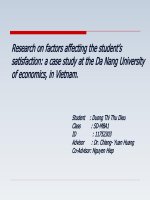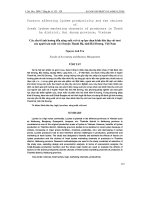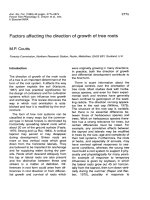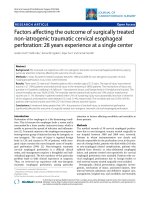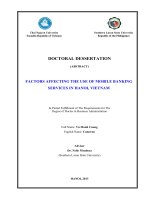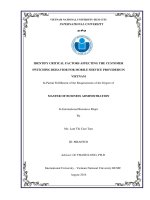Summary of Doctoral thesis: Factors affecting the satisfaction of enterprises for online tax services of tax authorities – Research in Hanoi
Bạn đang xem bản rút gọn của tài liệu. Xem và tải ngay bản đầy đủ của tài liệu tại đây (504.02 KB, 6 trang )
24
CHAPTER 5
SOLUTIONS AND RECOMMENDATIONS
5.1. Orientation of administrative procedure reform and modernization
of the tax industry
Firstly, Developing IT application for user
Secondly, developing and perfecting IT applications in the operation
of tax authorities:
Thirdly, developing and perfecting the information exchange system
with state agencies: Integrating and connecting with information systems
and databases of ministries and branches on a national scale, based on the
"Comments framework." create an e-Government platform.
5.2. Some proposals to the Tax Authority to improve the satisfaction of
businesses for online tax services
5.2.1. Enhance the level of safety and security of the system
5.2.2. Improve the quality of online support services
5.2.3. Enhance corporate confidence in online services and tax
authorities
5.2.4. Solution to improve the effectiveness of online tax services
5.2.5. Improve website quality and transmission quality
5.3. Other solutions and recommendations
1
INTRODUCTION
1. Rationale of the research
The urgency of the research topic is reflected in the theoretical,
practical and clarified in the research context: the strong development of ecommerce in general and online tax services in particular in Viet Nam.
Customer satisfaction is a positive result of exchanging behavior
between service providers and customers. Researching customer
satisfaction in areas is not a new issue. However, most of the satisfaction
research approaches the satisfaction and application in traditional fields
such as education, tourism, telecommunications, business .... In theory,
research space appeared when considering the customer satisfaction with
the public sector in general and the tax sector in particular. In some recent
studies in developed countries, researchers have paid attention to this
aspect. However, the studies only revolve around public health services
such as satisfaction with the quality of services of public hospitals, bus
services ... but not much research on the tax industry. In Vietnam, there are
some scientists who are interested in this field but they are only qualitative
and small-scale analyzes, so the number of research samples is not general
and new. The research applied in that locality as research by Do Thi Thanh
Vinh (2014), Danang Institute of Socio-Economic Research and
Development (2011), Nguyen Quoc Nghi et al (2015) ...
A number of previous studies on online tax services have looked at
people's satisfaction through a number of criteria such as convenience, ease
of use, service quality, trust and risk tolerance (Hussein et al., 2010). Aldin
et al. (2016) also researched user satisfaction with online tax services and
pointed out that system quality and information quality impact on user's
satisfaction. Evaluating the satisfaction of online tax services, Saha et al.
(2012) based on the Government's e-tax website as following: system
2
23
quality information and quality of information including the navigation and
accessibility of the website. Pinho et al. (2008) also assessed customer
satisfaction with online tax services through online service quality and
pointed out that convenience impact directly and is a success factor of
satisfaction with online tax services. Thus, through previous studies on
online tax services, the authors have assessed the satisfaction of online tax
services through factors including convenience, service quality, trust,
information quality, ... but not to mention the impact of trust on tax
authorities on online taxpayers’ satisfaction. In this research, the author will
mention the trust on tax authorities to find out its impact on business
satisfaction.
Vietnam is moving gradually to the administrative service to meet
the requirements of innovation and international integration. In service
administration, customer satisfaction with public administrative service is
the target to be targeted and also a measure of performance of state
administrative agencies.
Besides, the trend of economic integration in the region and in the
world is getting deeper and stronger. The development of tax policies
should be compatible with tax administration, ensuring international
standards towards modernization in order to create a favorable business
environment, attract domestic and foreign investment. To do this, the
application of information technology in tax administration is becoming
extremely important to create high adaptability of domestic and foreign
enterprises, as well as improve service quality, provide tax information for
taxpayers quickly and conveniently. Online tax declaration and payment
(electronic) is an inevitable trend as well as a new breakthrough in
administrative procedure reform, modernizing the tax industry step by step.
The overall program of administrative reform (PAR) in the 2011-2020
period of the Government aims: by 2020, the satisfaction of people,
Figure 4.2. SEM model
Standardized coefficient:
Satisfaction = 0.237 efficiency + 0.454 safety and security + 0.227
Web design + 0.277 Trust in Tax authorities + 0.293 service quality + 0.242
Trust in the internet
We see: β2> β5> β4> β6> β1> β3 so the factors affecting the satisfaction
of the enterprises in turn are the safety and security, service quality, Trust in
Tax authorities, Trust in the internet, efficiency, web design.
22
4.3.7. Enterprises on satisfaction level
The average value of overall satisfaction of enterprises for online
tax services is 3,8491. According to the above convention, they feel
satisfied with the online tax services provided by the tax authorities
4.4. Testing the difference in enterprise satisfaction with online Tax
services
The test results show that there is a difference in satisfaction among
enterprises of different sizes. The larger enterprise scale, the higher
satisfaction with tax services.
4.5. The impact of factors on enterprise satisfaction with online tax
services
3
organizations and enterprises towards the service of administrative agencies
will over 80%, for public non-business units reaching over 70% in order to
raise the national competitiveness, meeting Vietnam's integration needs
with countries in the region and the world. Resolution No. 19 / NQ-CP,
dated August 13, 2014, directs state administrative agencies to promote
administrative procedure reform, shorten the process, reduce the time and
cost of implementing administrative procedures, ensuring publicity,
transparency and improving the responsibilities of state administrative
agencies. The resolution required until the end of 2015, some targets
reached the average of the ASEAN-6 group. In order to achieve this goal,
the Ministry of Finance has directed the General Department of Taxation to
develop an action plan to focus on reforming administrative procedures
related to tax and customs in order to improve the business environment to
attract investment and improve national competitiveness.
Therefore, assessing the satisfaction of taxpayers will be an
important suggestion with the planning and implementation of
administrative reforms for administrative and professional agencies in
general and tax authorities in particular. Improving the level of taxpayers'
satisfaction with online tax services is necessary for the tax industry to
make timely adjustments, thereby building a reliable, fast and safe system
to meet the requirements of the quality management system according to
TCVN ISO 9001: 2008 to improve service quality, maximum support and
create favorable conditions for taxpayers in implementing tax policy.
On the other hand, measuring the satisfaction of taxpayers in
general and enterprises in particular is the best way to assess the
performance of the government process restructuring. Enterprises are the
main objects that the government provides products or services. Enterprises
satisfaction also stems from customer satisfaction, which is the feeling of
pleasure or disappointment when comparing products / services to their
4
21
wishes (Kotler & Keller 2006). Current research on satisfaction is about
customer satisfaction. The study of enterprise satisfaction is almost adjusted
from research on customer satisfaction and mainly about electronic
websites (Liu et al., 2010; Li & Song, 2012) or different types of public
services (Zou & Ma, 2009; Chen & Cao, 2013). E-government (e-gov) is
the use of information technology (especially the Internet) to support
government activities, attract citizens and provide government services
(Chandler & Emanuels, 2002). E-government need a change in
government's management model. The result of traditional government
processes is low efficiency and difficult coordination. It can not adapt to egovernment environments. Government process restructuring comes from
the process of restructuring business processes, being the nucleus of egovernment (Ye, 2007). Measuring enterprise satisfaction is the best way to
evaluate the performance of government process restructuring because the
ultimate goal of e-gov.
The results show that the scale is suitable for market data,
convergence, high reliability scale, discriminant value is achieved.
According to Vietnam’s annual e-commerce report, information
technology in Vietnam has potential. It becomes strong development trend
in the future. However, there are limitations from the environment such as
security, personal information security, law enforcement; issues of ensuring
security, transaction safety and creating customer satisfaction from
enterprise; a matter of awareness and belief from users.
In Vietnam, the e-tax service started in August 2009 through the
online tax filing system (iHTKK) which was first piloted for enterprises in
Ho Chi Minh City, Hanoi, Da Nang and Ba Ria - Vung Tau. So far, the Tax
Department has implemented the tax declaration and electronic tax payment
for 63/63 provinces and over 300 subordinate of Tax Departments, the
number of enterprises currently paying tax is over 80%. However,
enterprise that pay taxes online still have some problems, such as not really
4.3. Assessment of enterprises on factors affecting satisfaction of online
tax services
4.3.1. Efficiency
For the effectiveness of the online tax service, enterprise highly
evaluated time and cost efficiency.
4.3.2. Safety and security
The average value of an enterprise's assessment of the safety and
security of online tax services is 3,1386. According to this result, they feel
the safety and security of the service is at an average level
4.3.3. Web design
The average value of an enterprise's assessment of the web design
of online tax services is 3,0917. According to this result, they feel the web
design of the service is average
4.3.4. Service quality
The average value of an enterprise's assessment of the service
quality of online tax services is 3,1304. According to this result, they feel
the service quality of the service is average.
4.3.5. Trust in the internet
The average value of an enterprise's assessment of internet
confidence in online tax services is 3.1167. According to this result, they
feel the faith in the internet of services is on average
4.3.6. Trust with tax authorities
The average value of an enterprise's assessment of its belief in tax
authorities for online tax services is 3,1018. According to this result, they
feel faith in the tax of the service is at medium level.
20
5
The results of KMO coefficient = 0.737> 0.5 and Barlett's test have a
value of 3504,347 at the significance level of Sig = 0.000 <0.05, showing that the
observed variables belong to the same correlated factor. close together. In
addition, observed variables also achieve convergent and discriminant values.
believing in the security, safety of the web, weak care and answering
services ...
4.2.3. Factor analysis confirmed
The question is: how to increase the level of enterprise satisfaction
with online tax services in the current context of Vietnam? Therefore, the
author of the thesis selects the topic: "Factors affecting the satisfaction of
enterprises for online tax services of tax authorities - Research in Hanoi".
2. Research objective
General objective: Research the satisfaction of enterprises on
online tax services of tax authorities in Hanoi to help tax agencies improve
service quality, meet the requirements of innovation and international
integration, improving national competitiveness.
Research tasks
- Overview studies related to enterprise satisfaction with online tax
services, thereby systematizing the theoretical framework and selecting the
appropriate theoretical framework to assess the satisfaction of enterprises
with online tax service.
- Analyzing the impact of each factor on the satisfaction of
enterprises. Since then, assessing what makes businesses unhappy or
satisfied, analyzing the reasons for unsatisfactory businesses for online tax
services.
- Based on the reality of enterprises’ satisfaction, the author
proposes some solutions and recommendations to improve enterprises’
satisfaction for online tax services of tax authorities in Hanoi.
3. Subjects and scope of research
a. Research subjects: Factors affecting the satisfaction of
businesses for online tax services of tax authorities in Hanoi
Figure 4.1. The CFA standardized results
6
19
b. Research scope
+ Research is done for businesses using online tax services in
Hanoi city. Enterprises in the study are enterprises that have done online
transactions with tax authorities in Hanoi.
Online tax services include online tax registration, online
return, online tax payment and online tax refund. However, the online
service mentioned in the dissertation mainly focuses on online
declaration and payment services of enterprises because this is one of
first services that the tax branch has deployed.
tax
tax
tax
the
+ Research period: 2014-2017 includes research at desk data,
sociological surveys and conducting in-depth interviews.
4. New contributions of the thesis
- The thesis has made positive contributions to generalizing the
theoretical issues of satisfaction. To achieve the research goal, the author
has developed the concept of enterprise satisfaction for online tax services
as follows: "Satisfaction is the satisfaction state of customers for direct tax
services. The route is determined based on the objective evaluation of the
customer after using the service. In other words, satisfaction is determined
through the perceived value of service users (businesses)”.
- The thesis has proposed a model to study the factors affecting the
satisfaction of businesses for online tax services, in which the author
proposed a new factor that is a factor of trust with tax authority.
- The factors have an impact on the satisfaction of enterprises with
respect to online tax services, but the degree of impact of the factors is
different. If in previous studies, the level of factor trust in the internet is
low. In this study, research results indicate that trust in the internet has a
of factors. The analytical results show that the scale data is reliable and can be
used to study official calculation. In addition, the regression model is also
determined to be consistent with research data. In other words, 79.5% of
satisfaction can be explained by the impact of 6 factors: Trust in tax authorities,
trust in Internet, service quality, web design, safety and security, efficiency.
CHAPTER 4: FINDING
4.1. Describe investigation data
There are 300 votes were issued and 300 votes were collected. In
which, the valid votes are 280 votes, accounting for 93.33%. Among 280
enterprises participating in this study, 50 enterprises with less than 50
people account for 27.9%. Enterprises with scale from 50 to 100 employees
including 85 enterprises accounted for 30.4%. Enterprises with scale from
100 to 500 people including 89 enterprises accounted for 31.8%. Largescale enterprises of more than 500 people, including 2 enterprises, account
for 10% of the total research sample. Enterprises have used online tax
services for less than 3 years, accounting for 37.1%; enterprises have used
the service for 3-5 years, accounting for 31.8%. The group of enterprises
that have used the service for more than 5 years accounted for 31.1%.
4.2. Inspection of survey data
4.2.1. Cronbach Alpha reliability coefficient test
The reliability test results show that the scales in the research are reliable
4.2.2. Exploratory factor analysis (EFA)
From the results of the reliability analysis of the scale above, the
first factor analysis was conducted based on the 27 observable variables of
the independent variables affecting satisfaction when using electronic tax at
the enterprise. career.
18
7
CHAPTER 3: RESEARCH METHOD
large impact on enterprises’ satisfaction with online tax services in Hanoi.
Specifically, this factor ranked second after the level of safety and security.
3.1. Research process
Tool
Work
Result
Literature review
Preliminary model /
Building initial measure
Qualitative research
Models and measures
adjustment
Preliminary quantitative
research (50 people)
Cronbach
Alpha, EFA
Official quantitative
research (300 people)
- The thesis also shows that there is a difference in satisfaction with
online tax services when considering the size of enterprises. Specifically,
the larger the enterprise, the higher the satisfaction level.
- Proposing a solution to improve the satisfaction of enterprises for
online tax services in accordance with the research context in Hanoi city,
including solutions that can be applied right in conditions.
Complete measurement
Cronbach
Alpha, EFA,
CFA
Official scales
SEM
Hypothesis test
Solution
3.2. Qualitative research
Through qualitative research, the author found a new factor affecting the
satisfaction of businesses for online tax services as "Trust in Tax authorities".
3.3. Preliminary quantitative research
In preliminary quantitative research, the author examines the
reliability of the scale, confirmatory factor analysis and regression analysis
8
17
CHAPTER 1
H1: Efficiency has a positive impact on enterprise’s satisfaction with online
tax services
OVERVIEW OF RESEARCH
1.1. The satisfaction with online public services
The great progress of information and communication technology
and its deployment in the public sector has played an important role in the
government's efforts to implement public sector reform (Yong and Koon,
2003). Some scholars argue that the use of information technology in the
public domain is the second revolution in public management. Information
and communication technology seeks to transform not only the way of
delivering public services but also changing the basic relationship between
government and citizens (Saxena, 2005). However, there are others who
consider online public services as a sub-group and promote public sector
reform (Yong and Koon, 2003). Because the goal of online public services
is to improve the efficiency and effectiveness of the public sector in public
services (Criado et al., 2002). In other words, the application of public
online services in the public sector is mainly related to the expansion and
deepening of reforms.
The application and use of online public services has special
implications for developing countries. Unlike developed countries,
developing countries lack high quality resources to provide adequate
services to their citizens. The concept of information and telephone service
provision is not common in most developing countries. In traditional public
services, to carry out any kind of government service, organizations and
individuals need to interact directly with government employees, which will
cause them to consume considerable time. time, effort, money. Therefore,
providing government online services will save time and cost. Transparency
factors built into online channels can also reduce corruption - a serious
problem in some developing countries. Therefore, the application of online
H2: Safety and security have a positive impact on enterprise’s satisfaction
with online tax services H3: Web design has a positive impact on
enterprise’s satisfaction with online tax services
H4: Quality of service has a positive impact on enterprise’s satisfaction
with online tax services
H5: Trust in the Internet has a positive impact on enterprise’s satisfaction
with online tax services
16
9
CHAPTER 2
THEORETICAL AND RESEARCH MODEL
OF SATISFACTION FOR ONLINE TAX SERVICE
public services is a revolution in the provision of government services in
developing countries.
2.1. Definition and classification of satisfaction
The author gives the theory of satisfaction as well as the way to
classify satisfaction
Table 1.1. Factors affecting satisfaction with online public
service
Author
2.2. Public services and public administrative services
The author provides definitions, characteristics and how to classify
public services and public administrative services.
Aldin et al. (2006)
- Quality system
- Quality information
- Social influence
2.3. Online tax service
services
Wangpipatwong et al.
(2005)
2.4. Research model and hypothesis
Figure 2.4: Theoretical research model
Web design
H3
- Quality information
- Quality system
- Quality information
- Effectiveness
Service quality
H4
Trust in internet
H5
E-government
acceptance and user
satisfaction
Factors affecting the
application of egovernment websites
- Effectiveness
McKinney et al (2002)
H2
- Quality system
- Easy to use
H1
Safety and security
Research area
- Easy to use
The author presents the concept and characteristics of online tax
Efficiency
Factors affecting
satisfaction with
online public services
Enterprise’s
satisfaction
with online tax
services
Anwer et al (2016)
Measure customer
satisfaction with the
website
Evaluate e-government
services from citizen's
satisfaction
- Effectiveness
- Easy to use
awareness
- Security of
information and
transactions
- Enterprise size
- Time to use
the service
- Support Services
Abhichandani et al
10
(2005)
- Reliability
- Calculating utilities
Evaluate satisfaction
15
with e-government
Author
Impact factor
Research results
- Effectiveness
- Flexibility
- Custom
Parasuraman et al
(2005)
- Effective
Quality online service
- Commitment
- Readiness of the
system
- Security
Pinho et al (2008)
- Convenience
- Service quality
Satisfaction in the
online public sector
- Quality information
Xenia and Mentzas
(2012)
- Trust
- Effectiveness
Quality of online
public services
- Faith
- Citizens support
Kanaan et al (2016)
- Quality information
- Easy to use
awareness
The success of egovernment
- Personalized
- Faith
Cao Duy Hoang, Le
Nguyen Hau (2011)
- Quality of staff
- Infrastructure
- Easy access
- Service process
Quality of public
administrative services
and citizen satisfaction
on tax policies and changes,
adjustments to the business in
a complete, timely and
accurate manner; ensure
facilities in the one-stop
department, improve the
service attitude of tax
officials in the process of
receiving applications and
guiding
businesses;
encourage enterprises to
submit their tax declaration
dossiers early to limit
overcrowding in the process
of receiving applications at
the end of the payment
deadline.
14
11
1.2. Studies of satisfaction with online tax services
Author
services”
Impact factor
Research results
- Safe
- Price
- Web display
- Personalized
Nguyen Thi Quynh - Ability to access
Trang and Nguyen information
Thi Hong Dieu - Infrastructure
(2012)
Declaration
"Surveying
the procedure
satisfaction level of
- Service attitude of
enterprises with tax
tax officials
declaration
and
Resolve
the
payment
complaint report
procedures"
Survey results show that most
businesses are satisfied with
the procedures for tax
declaration and payment at
the City Tax Department and
district
tax
offices.
Specifically,
56.4%
of
businesses rated satisfaction
and were very satisfied; only
2.6% of businesses rated not
satisfied and dissatisfied;
However,
the
rate
of
businesses
rated
normal
accounts for quite high with
40.9%.
From the results of the
survey,
the
author
recommended tax authorities
to pay attention to promoting
administrative reforms in the
field of tax declaration and
payment; provide information
Online Tax Service is a type of online public service provided by
the State to organizations and individuals in the network environment,
including: providing online information related to tax and dialogue, direct
inquiries, tax registration, submission of declarations, declaration, payment,
refund, settlement of complaints and denunciations of taxpayers and
provision of electronic invoices. Along with the strong and explosive
development of information technology, the application of technology to
public services is focused on, especially with tax services. So, researchers
have paid much attention to online tax services.
Table 1.2. Factors affecting satisfaction
Author
Impact factor
Lee et al. (2008)
- Web design
"User evaluations - Convenience
of
tax
filing - Effectiveness
websites:
A
- Service quality
comparative study
of South Korea and
Turkey"
edividence
India"
Impact factor
from system
- National culture
Zaidi et al (2017)
- Use computer skills Easy to use and useful
awareness has a positive
"Moderating effect - Web design
impact on individual user
of culture on e- - Useful awareness
satisfaction
and
higher
filing
taxes:
- Quality information
13
Research results
satisfaction is related to the
intention to apply higher
online tax payments.
Personalization, completeness
Islam
and - Personalized
colleagues (2010)
-Adequacy
of of information, web design
and security are used to
“Factors of user information
measure the content of
satisfaction in the - Security
electronic
information
Malaysian income
- Reliability
systems. System quality
tax
e-filing
- Time efficiency
measures refer to the desired
system”
- Support Services
characteristics
of
the
electronic information system
- Web design
by
using
usability,
availability, reliability, and
time efficiency. Then the
overall support is provided by
the service provider in the
direction of the electronic
information system.
Geetha and Sekar - Safety
(2012)
- Exactly
"E-filing income - Web design
tax: Awereness and
- Availability
satisfaction level of
individual
tax
payers
in
The study compared webbased tax payment systems of
Turkey and South Korea.
Although Turkey has a
complex tax system, but
Turkish individual users do
not find the tax payment
system difficult to use and
probably because they are
regular accountants who use
the system.
12
Author
Research results
This study shows that current
users are satisfied with
electronic filing facilities but
most individual taxpayers are
not aware of electronic filing
and e-payment procedures, so
it should be enough steps to
Author
Coimbatore
India"
Impact factor
city,
Puthur et al (2016)
create awareness in the minds
of
taxpayers
regarding
electronic tax payment.
- Web design
"Tax
payer - Useful awareness
satisfaction
and - Trust in the internet
intension to re-use
government site for
e-filing"
Chumsombat
(2014)
Research results
- Effectiveness
- Service quality
"Factors
- Trust
influencing
user
satisfaction of etax filing: The
study of smaill and
medium
enterprises"
Pinho et al (2007)
- Trust
“Impact
of
SERVQUAL
online certification
regarding
certification
account: the case
of
taxation
- Response
- Access
- Flexibility
- Easy to use
- Effective
- Trust
Through access to both
qualitative and quantitative
methods, the results show that
web design, useful awareness
and trust are positively related
to taxpayer satisfaction.
The researcher found that
efficiency, service quality and
trust have a positive and
significant impact on the
satisfaction of small and
medium enterprises.
The study also shows that
empathy, tangibility and
convenience
are
factors
contributing
to
the
improvement of accountants'
satisfaction with online tax
services.

